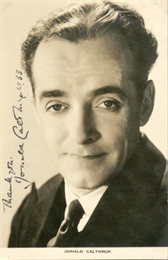Donald Calthrop
Donald Calthrop | |
|---|---|
 Autographed still, 1933 | |
| Born | Donald Esme Clayton Calthrop 11 April 1888 Chelsea, London, England |
| Died | 15 July 1940 (aged 52) Eton, Berkshire, England |
| Occupation | Actor |
| Years active | 1916-1940 |
Donald Esme Clayton Calthrop (11 April 1888 – 15 July 1940) was an English stage and film actor.[1]
Born in London, Calthrop was educated at St Paul's School and made his first stage appearance at eighteen years of age at the Comedy Theatre, London.[2] His first film was The Gay Lord Quex released in 1917. He starred as the title character in the successful musical The Boy in the same year.[3] He then appeared in more than 60 films between 1916 and 1940, including five films directed by Alfred Hitchcock.
He died in Eton, Berkshire from a heart attack while he was filming Major Barbara (1941).[2] According to Ronald Neame in his autobiography, some shots in the final film had a stand-in playing Calthrop's role (from the back) and a piece of dialogue was recorded using an unnamed person who impersonated Calthrop's voice.
He was the nephew of dramatist Dion Boucicault.[2]
Selected filmography
- Altar Chains (1916)
- Masks and Faces (1917) - Lovell
- The Gay Lord Quex (1917) - Valma
- Goodbye (1918) - Capt. Richard Adair
- Nelson (1918) - Horatio Nelson
- Shooting Stars (1928) - Andy Wilkes
- The Flying Squad (1929) - Sederman
- The Clue of the New Pin (1929) - Yeh Ling
- Blackmail (1929) - Tracy
- Atlantic (1929) - Pointer
- Spanish Eyes (1930) - Mascoso
- The Night Porter (1930) - The Porter
- Song of Soho (1930) - Nobby
- Loose Ends (1930) - Winton Penner
- Juno and the Paycock (1930) - Needle Nugent (uncredited)
- Two Worlds (1930) - Mendel (British Version)
- Murder! (1930) - Ion Stewart
- Almost a Honeymoon (1930) - Charles, the butler
- Elstree Calling (1930) - Himself / Petruchio in Taming of the Shrew
- Cape Forlorn (1931) - Parsons
- Uneasy Virtue (1931) - Burglar
- The Ghost Train (1931) - Saul Hodgkin
- Many Waters (1931) - Compton Hardcastle
- The Bells (1931) - Mathias
- Potiphar's Wife (1931) - Counsel for Defense
- Money for Nothing (1932) - Manager
- Number Seventeen (1932) - Brant - Nora's Escort
- Fires of Fate (1932) - Sir William Royden
- Rome Express (1932) - Mr. Poole
- F.P.1 (1933) - Sunshine, the Photographer
- I Was a Spy (1933) - Cnockhaert
- Early to Bed (1933) - Peschke
- Friday the Thirteenth (1933) - Hugh Nicholls
- This Acting Business (1933) - Milton Stafford
- Sorrell and Son (1933) - Dr. Richard Orange
- It's a Cop (1934) - Charles Murray
- Nine Forty-Five (1934) - Dr. Venables
- Orders Is Orders (1934) - Pavey
- Red Ensign (1934) - Macleod
- The Clairvoyant (1935) - Derelict (uncredited)
- The Divine Spark (1935) - Judge Fumaroli
- Me and Marlborough (1935) - Drunken Yokel
- The Phantom Light (1935) - David Owen
- Man of the Moment (1935) - Godfrey
- Scrooge (1935) - Bob Cratchit
- Broken Blossoms (1936) - Old Chinaman
- The Man Behind the Mask (1936) - Dr. Harold E. Walpole
- The Man Who Changed His Mind (1936) - Clayton / Lord Haslewood
- Fire Over England (1937) - Don Escobal
- Thunder in the City (1937) - Dr. Plumet
- Cafe Colette (1937) - Nick
- Love from a Stranger (1937) - Hobson
- Dreaming Lips (1937) - Philosopher
- Band Waggon (1940) - Hobday
- Let George Do It! (1940) - Frederick Strickland
- Charley's (Big-Hearted) Aunt (1940) - Guide (uncredited)
- Major Barbara (1941) - Peter Shirley
References
- ^ "Donald Calthrop". BFI. Archived from the original on 11 July 2012.
- ^ a b c Bruce Eder. "Donald Calthrop - Biography, Movie Highlights and Photos - AllMovie". AllMovie.
- ^ "Donald Calthrop - Actor". britishsites.co.uk.
External links
- Donald Calthrop at IMDb
- Donald Calthrop at the BFI's Screenonline
- Donald Calthrop at the Internet Broadway Database
